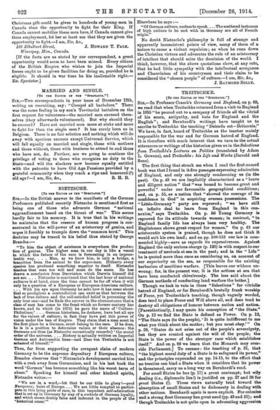NIETZSCHE.
[To THE EDITOR 01 THE "SPECTATOR."] SIR,—In the British answer to the manifesto of the German Professors published recently Nietzsche is mentioned first as being one of those who advocate German " national
aggrandizement based on the threat of war." This seems hardly fair to his memory. It is true that in his writings he maintains that the essence of human progress is con- centrated in the will-power of an aristocracy of genius, and urges it forcibly to trample down the "common herd." This doctrine may be traced to his belief thus stated by George Brander :—
"To him the object of existence is everywhere the produc- tion of genius. The higher man in our day is like a vessel in which the future of the race is fermenting in an impene- trable way. . . . Man, as we know him, is only a bridge, a transition from the animal to the super-man. Hitherto every species has produced something superior to itself. Nietzsche teaches that man too will and must do the same. He ban drawn a conclusion from Darwinism which Darwin himself did not see. . . . Nietzsche is convinced that the last hour of national cultures is at hand, since the time cannot be far off when it will only be a question of a European or European-American culture. . . . With his eye upon Germany he asks how it has come about that so prodigious a contradiction can exist as that between the lack of true culture and the self-satisfied belief in possessing the only true one—and he finds the answer in tho circumstance that a class of men has come to the front which no former century has known, and to which (in 1873) he gave the name of Culture- Philistines.' . . . German historians, he declares, have lost all eye for the values of culture ; in fact they have pat this power of vision under the ban of Empire. They claim that a man must in the first place be a German, must belong to the race. If he does, lie is in a position to determine values or their absence : the Germans are thus (as Nietzsche sarcastically remarks) 'the moral order of the universe. . .. History is actually written on Imperial German and Antisemitic lines—and Herr von Treitschke is not ashamed of himself:" Thus, far from supporting the arrogant claim of modern Germany to be the supreme depositary f European culture, Brandea observes that " Nietzsche's development carried him with a rush away from Germanism, and in his last book the word ' German' has become something like his worst term of abuse." Speaking for himself and other kindred spirits, Nietzsche writes:— We are in a word,—let that be our title to glory!—good Suropeans; heirs of Europe.... We are little tempted to partici- pate in this lying pride of race, in this impudent self-admiration that is set up in Germany by way of a cockade of German loyalty, and which seems doubly false and indecent in the people of the `historical sense:"
Elsewhere he says :-
" Of German culture, useless to speak. . .. The scattered instances of high culture to be mot with in Germany are all of French origin."
No doubt Nietzsche's philosophy is full of strange and apparently inconsistent points of view, many of them of a nature to cause a violent repulsion ; as when he runs down the Christian virtues and advocates the rule of an aristocracy of intellect that should seize the dominion of the world. I think, however, that the above quotations show, at any rate, that he had little sympathy with the intellectual arrogance, and Chauvinism of his countrymen and their claim to be considered the "chosen people" of culture.—I am, Sir, &c.,
J. RAYMOND SOLLY.


































 Previous page
Previous page